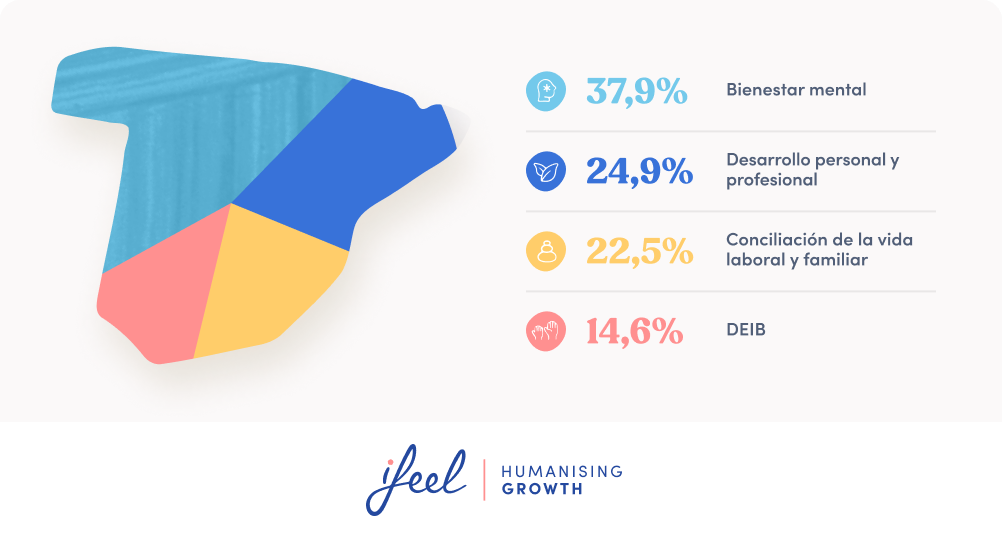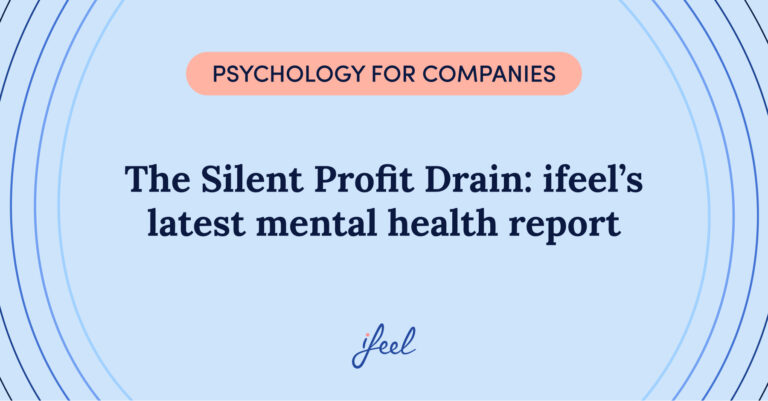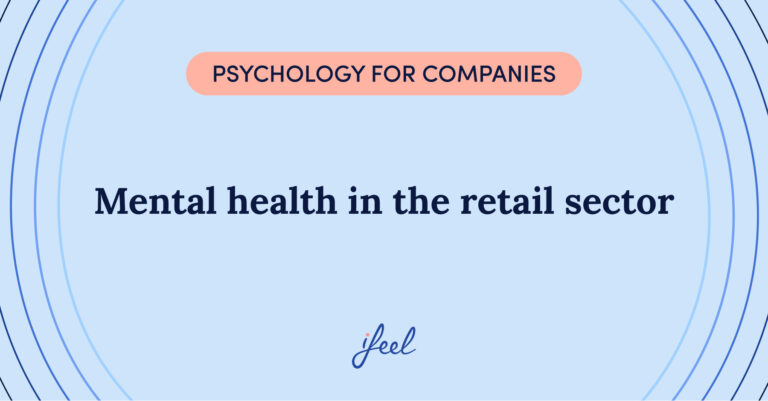Spain’s employee mental health landscape: A European perspective
Across Europe, employee mental well-being has become a top priority for companies looking to nurture healthier and more productive workplaces. Spain, with its unique cultural and economic landscape, faces specific challenges and opportunities when it comes to fostering workplace well-being. So, how does Spain compare to the European average?
To answer this, we’ve analysed data across key areas of employee well-being, providing actionable insights for employers in Spain. Let’s take a closer look at trends in mental well-being, work-life balance, diversity, equity, inclusion, and belonging (DEIB), and personal and professional development.
👉 Want to dive deeper? Download our free whitepaper, ‘Mapping the Impact,’ for exclusive insights into European workplace well-being.
What’s driving workplace well-being in Spain?
Our analysis focuses on four essential categories that impact employee mental health and satisfaction:
- Mental well-being: Anxiety, depression, stress
- Work-life balance: Family responsibilities, maternity/paternity, sleep
- DEIB: LGBTQA+ inclusion, disability, sexuality
- Personal & professional development: Skill growth, career progression
Understanding these categories can help employers identify key areas of focus to improve workplace well-being, increase employee engagement, and create more supportive environments.

A European Breakdown: Employee Well-being Needs by the Numbers
- Mental Well-being (38%)
Mental health remains the most significant area of concern across Europe, with 38% of employees identifying mental well-being as a top priority. Approximately 10% of Europeans experience mental health disorders such as anxiety or depression at any given time, underscoring the need for robust mental health support in the workplace. - Work-life Balance (22%)
Balancing professional and personal life is increasingly challenging, with 22% of employees seeking better work-life integration. The demand for flexible working conditions has grown as employees struggle to manage their workloads alongside personal responsibilities. - Personal & Professional Development (24%)
European employees are eager for growth, with 24% prioritising opportunities for personal and professional development. Continuous learning, skill acquisition, and career progression are key drivers of job satisfaction and mental well-being. - DEIB (15%)
Diversity, equity, inclusion, and belonging initiatives are essential for building supportive workplaces. Investing in DEIB not only promotes social cohesion but also enhances employee engagement by ensuring everyone feels valued.
Spain’s well-being trends: How does it compare?
Now, let’s explore how Spain aligns with European averages in these critical areas and uncover what employers can do to address the unique challenges facing their workforce.
Mental well-being: 38% (Spain) vs. 38% (Europe)
Spain’s demand for mental well-being support mirrors the European average, with 38% of employees seeking mental health resources. The impact of the COVID-19 pandemic in Spain, which exacerbated anxiety, depression, and workplace stress, has highlighted the urgent need for comprehensive mental health solutions.
Implications for employers:
Spanish companies should offer access to emotional support tools, mental health programs, and services like therapy to support mental well-being. Creating a workplace culture that prioritises mental health conversations and provides proactive support can reduce stress and enhance overall productivity.
Work-life balance: 22% (Spain) vs. 22% (Europe)
Spanish employees face similar challenges to their European counterparts when it comes to work-life balance. The pandemic has redefined work environments, with flexible schedules and remote work becoming more prominent, but the balance between personal and professional duties remains a significant concern.
Implications for employers:
Spanish companies can improve work-life balance by offering flexible working conditions, such as remote work options and adaptable hours. Encouraging a workplace culture that respects personal time will help employees manage their responsibilities more effectively and improve job satisfaction.
Personal & rrofessional development: 24% (Spain) vs. 24% (Europe)
Spain exhibits a strong demand for personal and professional development, with 24% of employees seeking opportunities for growth. This demand is particularly high compared to other European nations, reflecting Spain’s competitive job market and the need for skill development to enhance employability.
Implications for employers:
Investing in robust development programs, including mentorship, training, and career advancement opportunities, is essential for Spanish employers. These initiatives can help employees grow their skills, improve job security, and remain competitive in the market.
DEIB: 15% (Spain) vs. 15% (Europe)
Spain’s demand for DEIB initiatives is consistent with the European average. Fostering diverse, equitable, and inclusive workplaces remains a priority for Spanish companies as they work to ensure all employees feel supported and valued.
Implications for employers:
Spanish companies should enhance their DEIB strategies by implementing inclusive hiring practices, offering diversity training, and creating employee resource groups. Cultivating a culture of belonging will drive engagement, reduce turnover, and improve the overall workplace atmosphere.

Taking action: Building a healthier workplace in Spain
Overall, Spain demonstrates a balanced focus on mental well-being, work-life balance, and professional development, reflecting a growing awareness of the importance of comprehensive workplace well-being strategies. Addressing these areas thoughtfully can help Spanish companies build healthier, more supportive, and more resilient workplaces.
To gain a deeper understanding of the mental health landscape in Europe, download the full report here.
Investing in employee well-being is not just a matter of compliance or corporate social responsibility; it is a strategic decision that can help companies thrive in an increasingly competitive and globalised market.
To assist in this process, our team of psychologists specialising in mental well-being has developed a mental well-being solution for large organisations aimed at helping companies enhance employee engagement and boost productivity.
This collaboration allows HR managers to receive personalised, data-based advice on the most effective measures for detecting employee mental health issues and assessing the workplace climate. It’s the best way to understand their needs.
We hope you found this article on key mental well-being trends in Spain interesting. If you want more information about our mental well-being solution for companies, simply request it, and we will contact your team soon.











